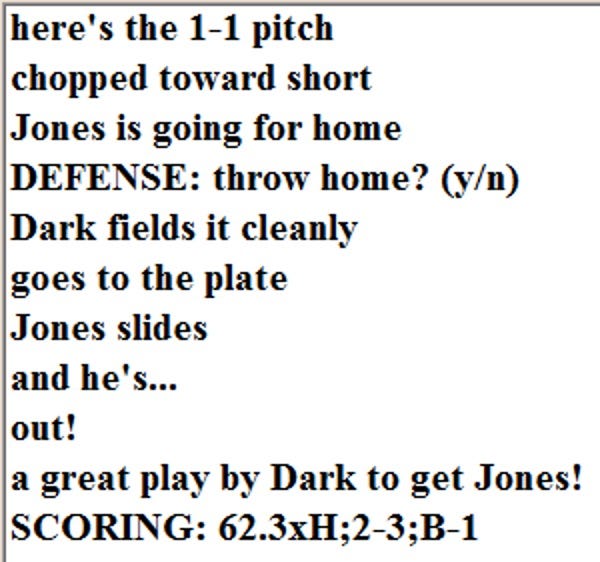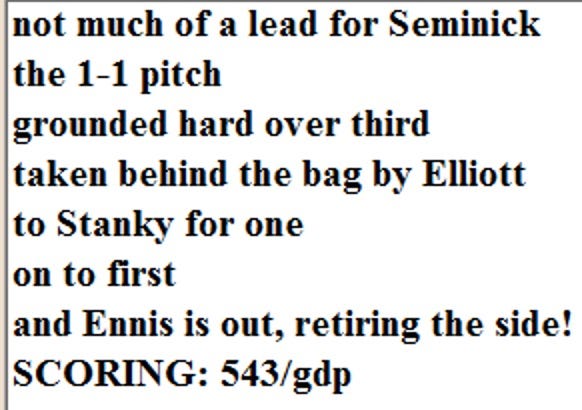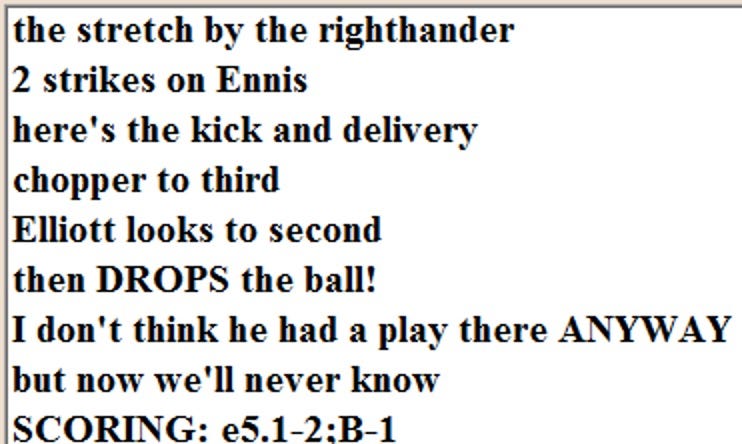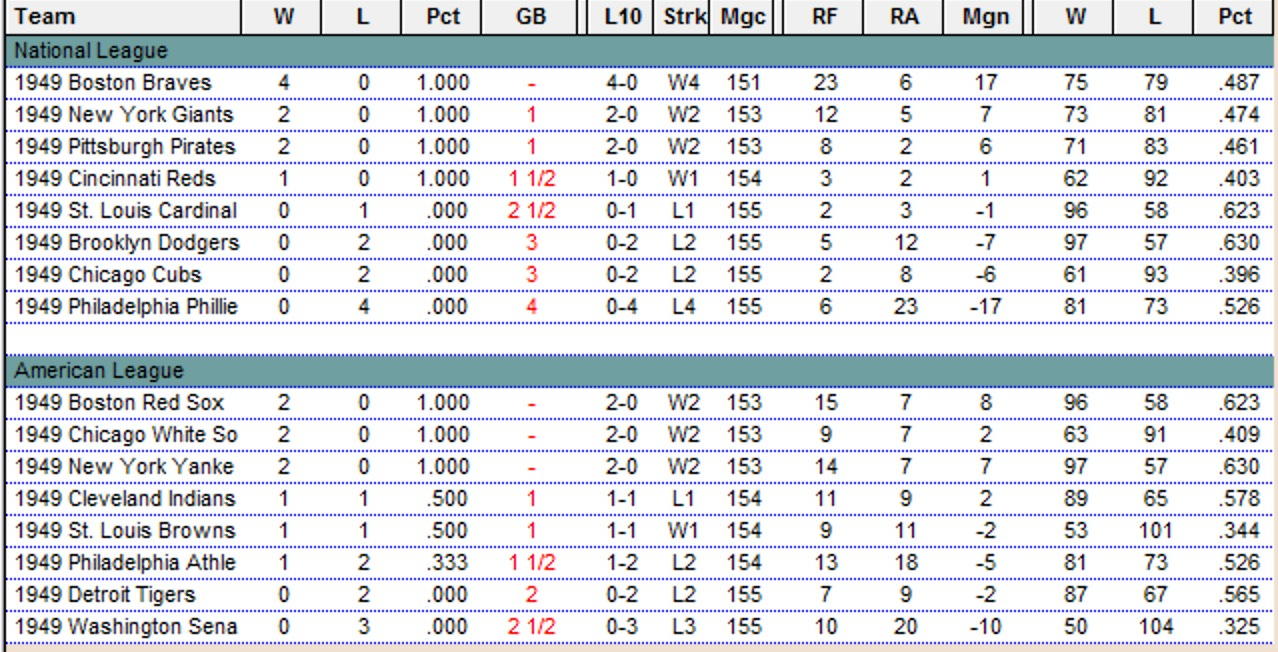Winning with Smallball
We’ve finally come to the final featured game for April 20, 1949. I’m still shocked that there were so many close games on the same day. If this is any indication of what this replay is going to be like, we’re in for a doozy.
Phillies at Braves
This one actually started out as a slugfest. Boston starter Bill Voiselle walked 5 in 3 innings, and Philadelphia wound up with a 4-3 lead going into the bottom of the third. Marv Rickert doubled home another run for Boston, knotting the score at 4-4 and setting the stage for what was to come.
I left Voiselle in the game, and he rewarded me for his patience, evening things out with 6 walks and 6 strikeouts by the end of the 7th.
The Phillies started to get to him in the top of the 8th inning, however. Philadelphia led the inning off with two straight base hits. Granny Hamner grounded out, putting runners on 2nd and 3rd with only one out. And that brought up veteran Eddie Miller:
This was a sign of things to come, as it turned out.
Pitcher Hank Borowy came up next. If you’re a Diamond Mind Baseball veteran, you’re expecting the computer to pinch hit for him here. Heck, I’d pinch hit for him, what with runners on second and third with two outs. But, no, the computer manager left him in.
And then Voiselle did what really only happens in 1949:
Okay — so now we’ve got the bases loaded with two outs, and my hair is turning prematurely grey. And, thanks to my own ingenious lineup construction, I’ve got to face Richie Ashburn next.
9th Inning Drama
Boston went quietly in the bottom of the 8th, bringing us into the 9th inning, still tied at 4.
Andy Seminick, who I put in the number 2 spot in the order for Philadelphia, lead off with yet another walk. Dick Sisler lined out, bringing up Del Ennis:
I decided that Voiselle had enough in the bottom of the 9th, and put in Pete Reiser to pinch hit. He fouled out, and the Braves went down in order.
Extra Innings
Reliever Bobby Hogue set the Phillies down in order in their half of the 10th. The drama started up again, though, when Bob Elliot singled for the Braves in the bottom half of the inning. Earl Torgeson then walked, putting runners on first and second with 1 out — all with Phillies starting pitcher Borowy still in there.
Tommy Holmes came up. Holmes had been hitting .071 so far that season, which is bad no matter which offensive metric you use. I decided to bunt:
Now we had the bases loaded with one out in the bottom of the 10th. Up came Jim Russell… and down he went, striking out on three pitches. Borowy showed that he still had it by inducing Al Dark to fly out weakly, and on we went to the 11th.
To The Twelfth
The computer manager finally took Borowy out for a pinch hitter in the top of the 11th, but couldn’t stop the Phillies from going down in order. Jim Konstanty came in to relieve him, and promptly struck out the side in the bottom half of the 11th.
Andy Seminick led it off for Philadelphia in the top of the 12th with a walk. After a quick fielder’s choice, Boston third baseman Bob Elliott made this blunder:
Diamond Mind gave Elliott an EX rating at third base for 1949, which shows just how rare this error was.
That’s all she wrote, though, as two straight Phillies hitters swung at the first pitch and popped the ball up.
Boston stranded a runner in its half of the twelfth, and on the show went.
One Precious Run
Remember Granny Hamner? He lined a base hit for the Phillies to start the 13th for his 3rd hit of the game. Eddie Miller bunted him to second, but the Phillies stranded the runner yet again with more popups.
Jim Russell walked for Boston in the bottom of the 13th, and the tension continued. Dark walked as well, bringing up Bill Salkeld, who was followed by the pitcher’s slot.
The bunt here seemed obvious to me. Runners on first and second with nobody out in an extra inning ballgame while at home — of course you play for that one run. And so we bunted:
I then had another managerial decision to make. Relief pitcher Nels Potter was up to hit, and we didn’t really have anybody better on the bench. I grit my teeth and left him in to swing away, figuring that he couldn’t ground into a double play with runners on second and third.
The result surprised me:
I never would have guessed that Potter would wind up with the game winning hit after all that. A look at his batting statistics shows just how remarkable this was:
He only managed 3 hits in real life — two of which were doubles, incidentally. He’s already got one of those in this replay, and it couldn’t have come at a more opportune time.
Other Games
For those who may have missed it, below are a list of the other games on April 20, 1949, including links to write-ups where applicable.
Red Sox 11, Athletics 4 at Philadelphia. Boston manhandles Philadelphia pitching. Detailed summary here.
White Sox 5, Tigers 4 at Detroit. Cass Michaels surprises the Tigers with a bomb in the 9th. Detailed summary here.
Browns 5, Indians 4 at St. Louis. The Browns barely squeak one by the World Champions. Detailed summary here.
Yankees 7, Senators 6 (11) at New York. Cliff Mapes continues to feast off American League pitching. Detailed summary here.
Giants 4, Dodgers 2 at Brooklyn. Brooklyn narrowly misses a chance to tie it in the bottom of the 9th. Detailed summary here.
Pirates 3, Cubs 0 at Chicago: Bill Werle throws a masterpiece against the Cubs. Detailed summary here.
Standings
Well, that was certainly an exhilarating experience. It’s too early to say anything about the standings, though I’m sure the northeast papers would have something to say about a potential all-Boston World Series.















